- Last Updated: January 15th, 2026
Key Takeaways
The Meta lawsuit challenges how social media companies like Facebook and Instagram impact young users, with accusations that practices may lead to mental health issues and misuse of personal data.
Legal outcomes from this case could enforce stricter regulations on tech giants, potentially changing how they handle user privacy and content monitoring.
The resolution of the Meta lawsuit is anticipated to have broad effects on internet policy, particularly concerning protections for children online and competition within the tech industry.
Overview of the Meta Lawsuit
On this page, we’ll discuss an overview of the Meta lawsuit, allegations of negligence in the Meta Lawsuit, potential regulation stemming from the Meta lawsuit, and much more.
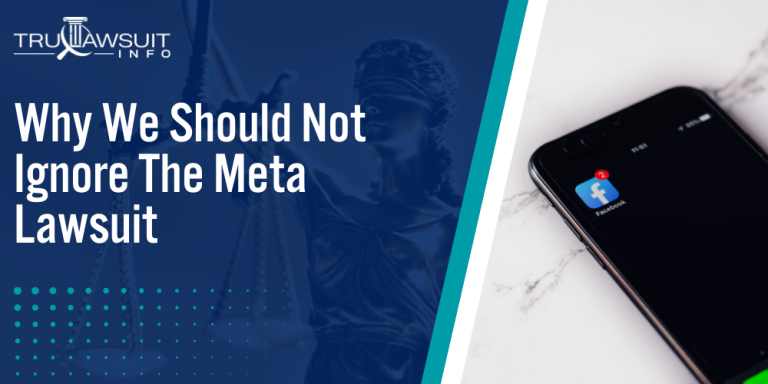
Intro to the Meta Lawsuit
The potential implications of the Meta Lawsuit include, but are not limited to:
- Civil penalties that could amount to hundreds of millions of dollars
- Establishing precedence in future social media harm lawsuits
- Revising guidelines for increasing user engagement.
Ignoring it could mean overlooking key discussions about online safety, data privacy, and corporate accountability.
If you or a loved one have experienced mental health issues after developing a social media addiction, you may be eligible to file a lawsuit.
Contact TruLawsuit Info for a free consultation, or use the chatbot on this page for a free case evaluation to see if you qualify for potential legal action.
Social Media Mental Health Crisis: Meta Lawsuits
Why shouldn’t we ignore the Meta Lawsuit?
The Meta lawsuit raises critical concerns about child safety and data privacy on social media platforms.
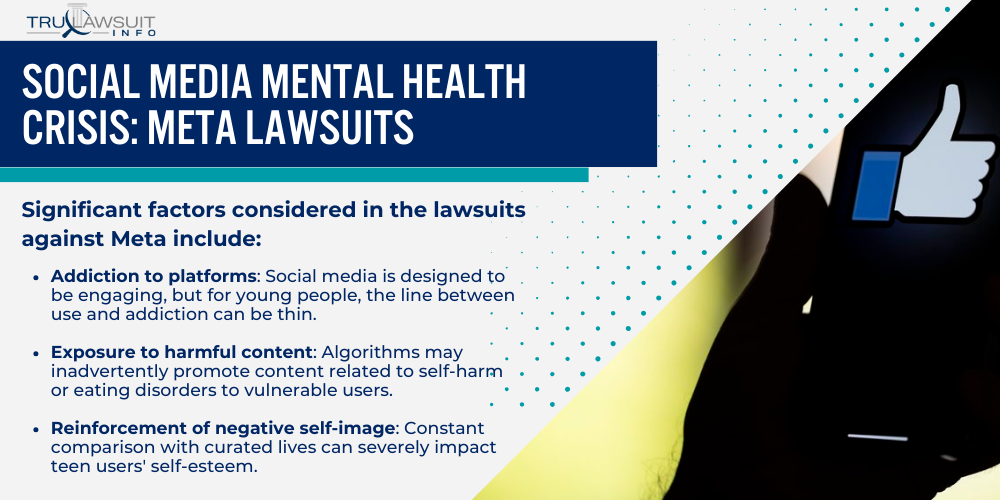
Allegations in the Meta lawsuit include failure to protect underage users from harmful content and its collection of data from children under 13 without parental permission.
Recent legal challenges have highlighted the serious concerns over social media’s impact on youth mental health, especially as it pertains to Meta’s platforms.
The lawsuits allege failures in protecting young and teen users from content that may contribute to mental health issues, including self-harm, sexual exploitation, and eating disorders.
Psychological Implications for Young People
In the complicated landscape of social media, the psychological implications for young users are increasingly coming to light.
It’s not just about general online safety; there’s a growing awareness of how social media contributes to various mental health problems.
Significant factors considered in the lawsuits against Meta include:
- Addiction to platforms: Social media is designed to be engaging, but for young people, the line between use and addiction can be thin. Features like infinite scroll and constant streams of alerts are hooking children and teens, contributing to the mental health crisis.
- Exposure to harmful content: Algorithms may inadvertently promote content related to self-harm or eating disorders to vulnerable users.
- Reinforcement of negative self-image: Constant comparison with curated lives can severely impact teen users’ self-esteem.
- Cyberbullying: Social media can be a conduit for bullying, which has a documented negative effect on mental health.
Protecting Children from Exploitation
The protection of children from sexual exploitation on social media is of utmost importance.
The inadequate control and monitoring of user interactions have resulted in lawsuits accusing Meta of not doing enough to safeguard young users.
Essential considerations include:
- Strict age verification methods: Ensuring that users are of appropriate age to handle content.
- In-depth monitoring of user content: Proactively seeking out and managing content that could lead to sexual exploitation.
- Transparent reporting processes: Creating clear pathways for reporting abuse or exploitation.
- Educational resources: Providing information to help children and teens understand the risks and protect themselves online.
Allegations of Negligence in the Meta Lawsuit
The Meta lawsuit reveals concerning allegations of neglect in protecting children from sexual abuse, online solicitation, and human trafficking.
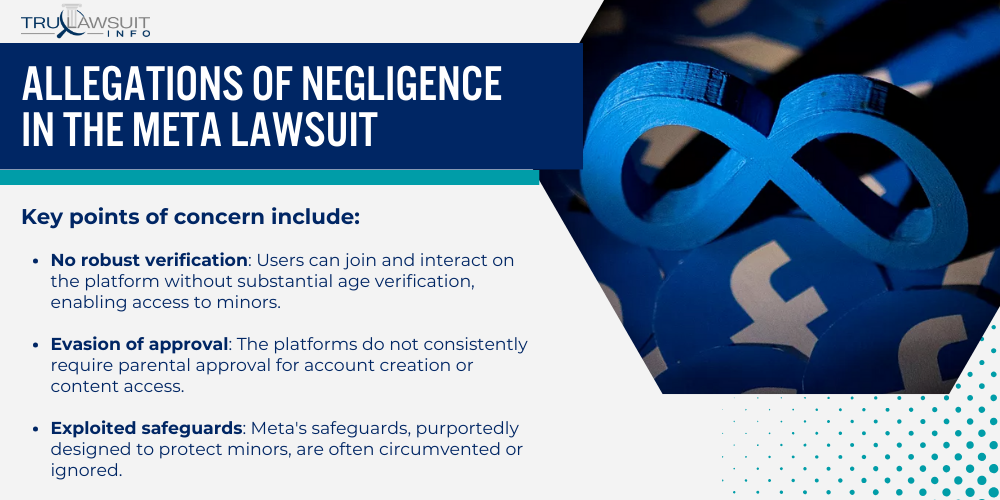
Additionally, it brings attention to an advertising-centric approach that overlooks the crucial aspect of parental consent.
Absence of Parental Consent
The suit highlights Meta’s platforms’ lack of parental consent mechanisms.
It underlines a systematic oversight in ensuring that the guardians of children and teens are involved in the decision-making process about their online activities.
Key points of concern include:
- No robust verification: Users can join and interact on the platform without substantial age verification, enabling access to minors.
- Evasion of approval: The platforms do not consistently require parental approval for account creation or content access.
- Exploited safeguards: Meta’s safeguards, purportedly designed to protect minors, are often circumvented or ignored.
- Prevalent inappropriate Content: A plethora of content unsuitable for minors remains easily accessible without parental knowledge.
Advertising Driven Model
The advertising model utilized by Meta is critiqued for prioritizing user engagement over the safety of missing and exploited children.
It’s argued that this model creates an environment where susceptible youths are exposed to potential harm.
Critiques of Meta’s advertising model extend to several specific practices that compromise user well-being, particularly among minors:
- Data exploitation: Meta’s platforms collect user data to tailor advertising, which can include vulnerable demographics.
- Unfiltered exposure: There is no sufficient curation of advertisements, leading to children and teens being shown inappropriate ads.
- Engagement over safety: The algorithms appear designed to maximize time on site, even at the risk of exposing users to harmful content.
- Inadequate response to complaints: Reports of abuse or exploitation frequently fail to elicit prompt and appropriate action.
The complaints, which allude to an overarching disregard for essential safety protocols, have sparked significant concern among parents, regulators, and child safety advocates.
Meta's Responsibility and Response
In addressing Meta’s alleged failures in consumer protection, the company presents a structured argument for its actions and describes initiatives geared towards improving online safety, especially for younger users.
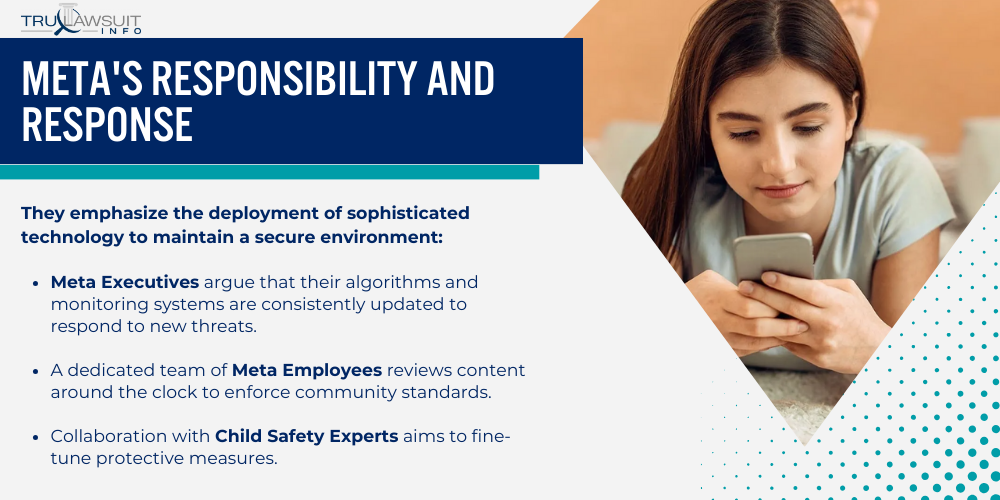
Meta’s Argument for User Protection
Meta Platforms defend their position by highlighting their commitment to safeguarding users with a multi-faceted approach.
They emphasize the deployment of sophisticated technology to maintain a secure environment:
- Meta Executives argue that their algorithms and monitoring systems are consistently updated to respond to new threats.
- A dedicated team of Meta Employees reviews content around the clock to enforce community standards.
- Collaboration with Child Safety Experts aims to fine-tune protective measures.
- Meta states that they actively engage with the National Center for Missing & Exploited Children to report and deter exploitative behavior.
- Initiatives to educate users about security settings and safe online behavior are regularly launched.
- A transparent reporting system offers users a direct line to raise concerns, which Meta promises to act upon diligently.
Initiatives by Meta to Safeguard Teens
In an era where digital presence significantly influences the younger generation, Meta takes a proactive stance toward ensuring a safer online environment for teenagers.
Recognizing the unique challenges faced by this age group in the digital realm, the company has embarked on a mission to create a more secure and empowering space for them.
To support teens and promote their welfare on its platforms, Meta outlines specific strategies:
- Introduction of new features that provide teens with more control over who can interact with them.
- Partnership with online safety organizations to develop educational content tailored for younger audiences.
- Implementation of age-appropriate experience modifications to restrict potentially harmful content from reaching underage users.
- Investment in sophisticated technology capable of detecting and preventing suspicious behavior aimed at teens.
- Development of resource centers in collaboration with Child Safety Experts to guide teens in navigating online spaces securely.
- Meta Employees receive training to understand better and address issues that particularly affect teen users.
Meta continues to convey its commitment to ameliorate and advance efforts for comprehensive user protection, with a notable focus on youth safety initiatives.
Legal Proceedings and Regulatory Action
Legal actions against Meta have brought into focus the intricate web of lawsuits and regulatory enforcement measures.
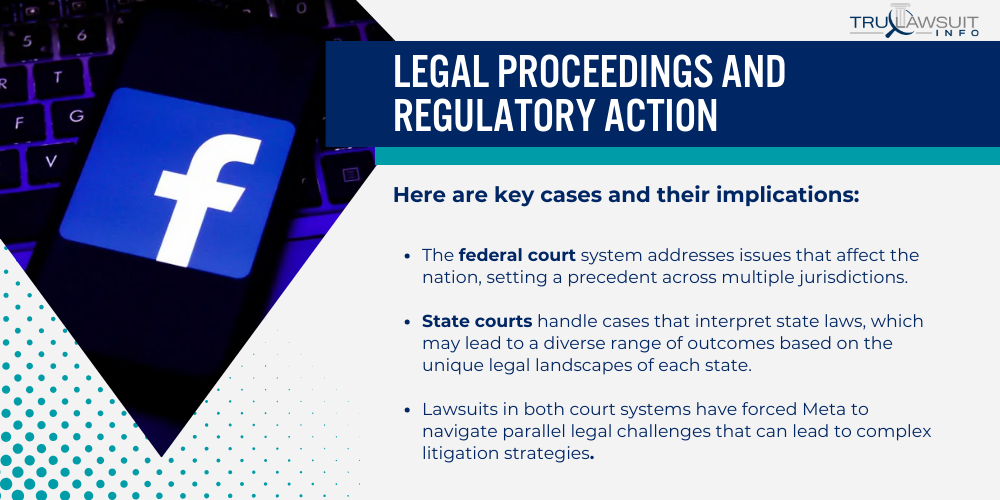
These cases, spanning federal and state courts and actions by various Attorneys General, underscore the company’s significant legal challenges.
State and Federal Court Cases
Litigation against Meta takes place in various jurisdictions, marrying federal court wisdom with the customized approach of state courts.
Federal lawsuits present unified legal questions, while state lawsuits often address specific concerns relevant to state law.
Here are key cases and their implications:
- The federal court system addresses issues that affect the nation, setting a precedent across multiple jurisdictions.
- State courts handle cases that interpret state laws, which may lead to a diverse range of outcomes based on the unique legal landscapes of each state.
- Lawsuits in both court systems have forced Meta to navigate parallel legal challenges that can lead to complex litigation strategies.
- These varying legal fronts require Meta to tailor its defense and approach to suit each jurisdiction’s nuances and legal standards.
Actions and Investigations by Attorneys General
A bipartisan coalition of Attorney Generals has initiated investigations into Meta’s practices, revealing key concerns over the company’s operations and policies.
These inquiries reveal several focal points:
- The adequacy of Meta’s data privacy protections.
- The transparency of Meta’s advertising practices and algorithms.
- The influence of Meta’s platforms on user behavior and society at large.
- Compliance with consumer protection laws across different states.
Attorneys General play a crucial role in representing the public interest at the state level, and their actions carry significant implications for Meta’s legal and regulatory compliance.
Their investigations can lead to large-scale reforms within the company or even set a precedent that influences the entire tech industry.
Implications for Social Media Platforms
The Meta lawsuit spotlights social media platforms’ practices, which could lead to significant changes across the industry.
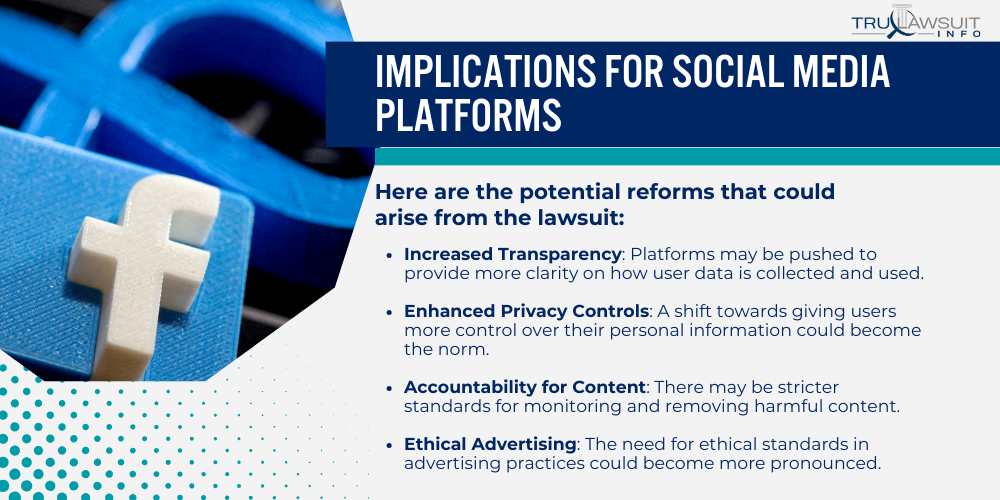
These changes may affect how platforms operate and regulate user interactions.
Reforming Practices Across Platforms
Social media platforms may feel the reverberations of the lawsuit in several critical areas.
Here are the potential reforms that could arise from the lawsuit:
- Increased Transparency: Platforms may be pushed to provide more clarity on how user data is collected and used.
- Enhanced Privacy Controls: A shift towards giving users more control over their personal information could become the norm.
- Accountability for Content: There may be stricter standards for monitoring and removing harmful content.
- Ethical Advertising: The need for ethical standards in advertising practices could become more pronounced.
- User Empowerment: Social media users might receive more power to influence how the platforms are governed.
- Developer Policies: Changes could also affect third-party developers’ access to platform data and APIs.
Impact on Social Media Regulations
The lawsuit against Meta might accelerate regulatory efforts worldwide.
The following are ways in which social media regulations could be impacted:
- Formation of New Policies: Governments may introduce new laws to regulate the social media landscape better.
- International Cooperation: There could be an increase in international efforts to create a cohesive regulatory framework.
- Industry Standard Setting: Platforms could collaborate to set industry-wide best practices and standards.
- Strengthening of Enforcement Mechanisms: Enforcement of existing regulations might be bolstered to ensure compliance.
By examining these potential changes, it is evident how the lawsuit against Meta could reshape the future of social media interactions and governance.
The Future of Online Child Safety
The online environment presents continuous challenges and opportunities in protecting the well-being of young people.
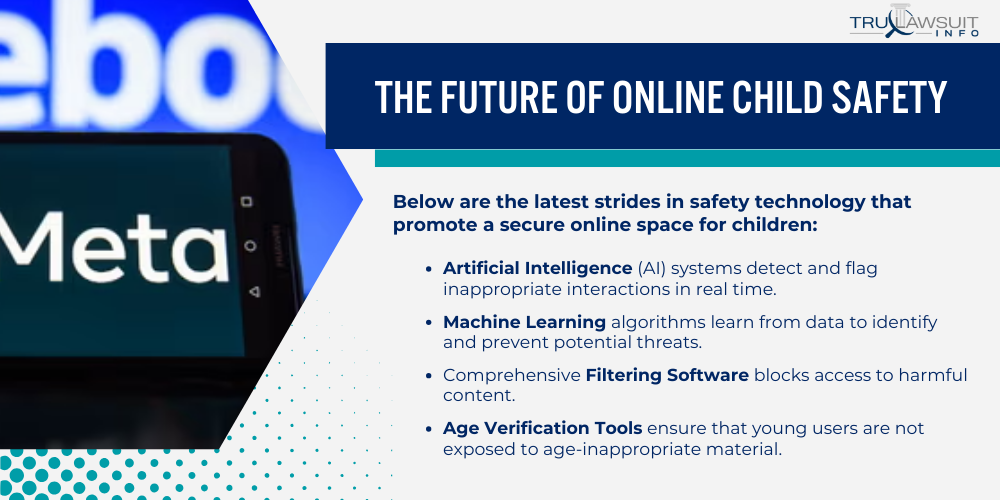
Innovative measures and collaborative efforts are critical for enhancing child safety in the digital realm.
Advancement in Safety Technology
Technological developments are paramount in safeguarding children online.
Safety experts are continually working on advanced solutions that can provide better protection for youth on the internet.
Below are the latest strides in safety technology that promote a secure online space for children:
- Artificial Intelligence (AI) systems detect and flag inappropriate interactions in real time.
- Machine Learning algorithms learn from data to identify and prevent potential threats.
- Comprehensive Filtering Software blocks access to harmful content.
- Age Verification Tools ensure that young users are not exposed to age-inappropriate material.
- Encryption techniques to protect data privacy and secure communication.
- Advanced Monitoring Systems keep a vigilant watch over online activities.
Creating a Task Force for Child Protection
Establishing a task force specifically designed for child safety is on the horizon to respond to the necessity for a concentrated focus on this cause.
The key functions of such a task force would include:
- Uniting child safety experts to address various issues facing young people online.
- Collaborating with tech companies to implement safe design practices.
- Offering educational resources to children and their guardians.
- Leading research initiatives to stay ahead of emerging threats.
- Enforcing existing online safety laws and policies.
- Advocating for new legislation that matches technological advancements.
Both advancements in safety technology and the creation of a dedicated task force demonstrate a strong commitment to the future of online child safety.
It’s clear that through these methods, the protection of young people in a digital world continues to become more robust and resilient.
Public and Expert Opinion
When examining the Meta lawsuit, it’s essential to consider the diverse perspectives of parents and guardians and heed the expert analysis and recommendations.
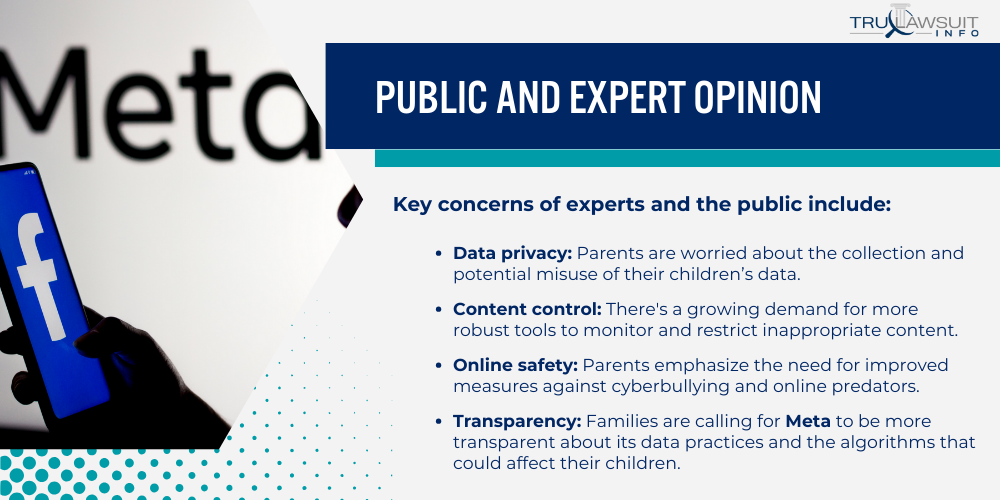
These insights offer a multifaceted understanding of the controversial proceedings surrounding the company.
Reactions from Parents and Guardians
Parents and guardians form a vocal entity in response to the Meta lawsuit.
Their primary concerns stem from the impact of Facebook‘s policies on family privacy and children’s online safety.
Key concerns include:
- Data privacy: Parents are worried about the collection and potential misuse of their children’s data.
- Content control: There’s a growing demand for more robust tools to monitor and restrict inappropriate content.
- Online safety: Parents emphasize the need for improved measures against cyberbullying and online predators.
- Transparency: Families are calling for Meta to be more transparent about its data practices and the algorithms that could affect their children.
- Minimal age: Discussions around what the minimal age should be for one to create an account on Facebook.
- Educational resources: A plea for Meta to provide educational material to foster digital literacy and responsible online behavior.
Expert Analysis and Recommendations
Experts approach the Meta lawsuit with a blend of technical savvy and legal foresight.
Their recommendations are geared towards establishing a safer online environment and ensuring Meta‘s accountability.
To address these challenges, experts propose the following strategies:
- Regulatory compliance: Experts emphasize that Meta must adhere to existing children’s online privacy laws.
- Updated legislation: Legal professionals suggest that current laws be re-evaluated to keep pace with digital advancements.
- Company policies: A thorough review and overhaul of Facebook’s internal policies is necessary to protect users.
- Research and development: Investment in technology to better detect and prevent harmful content is recommended.
- Industry standards: Establishing industry-wide standards for data privacy and user protection is crucial.
- Collaborative efforts: Calls for Meta to work alongside child safety organizations and educators to foster a safer online community.
Meta's Place in the Tech Industry
Meta, formerly known as Facebook Inc., has evolved into a behemoth in the tech industry, largely due to its massive advertising revenue streams and popular social media platforms, Facebook and Instagram.
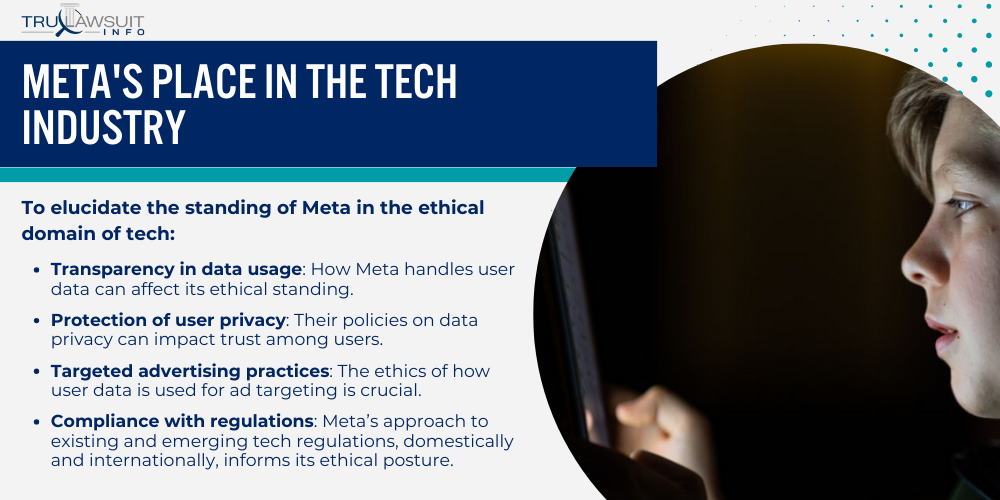
This growth has placed it under intense scrutiny related to business ethics and the long-term impact on its reputation.
Business Ethics and Ad Revenue
Meta’s business model is heavily reliant on advertising revenue, which raises concerns regarding business ethics and consumer privacy.
To elucidate the standing of Meta in the ethical domain of tech:
- Transparency in data usage: How Meta handles user data can affect its ethical standing.
- Protection of user privacy: Their policies on data privacy can impact trust among users.
- Targeted advertising practices: The ethics of how user data is used for ad targeting is crucial.
- Compliance with regulations: Meta’s approach to existing and emerging tech regulations, domestically and internationally, informs its ethical posture.
Meta’s dominance in the advertising space, especially through Facebook and Instagram, continues to be a pivotal aspect of its ecosystem.
Long-Term Impact on Meta’s Reputation
Meta’s reputation, spearheaded by CEO Mark Zuckerberg, is intertwined with user trust and the public’s perception of the company’s actions.
Discussing some of the pivotal factors that influence Meta’s reputation:
- Public response to litigation: The public perception of any lawsuit involving Meta can alter its standing.
- Adherence to ethical standards: How Meta aligns with ethical standards can dictate long-term trust.
- Response to misinformation: The efficacy of measures against misinformation on Facebook and Instagram helps shape its reputation.
- CEO’s influence: Mark Zuckerberg‘s decisions and leadership style are directly linked to Meta’s image.
Each of the listed factors contributes to the grand narrative around Meta and will continue to do so as it navigates the evolving tech landscape.
Frequently Asked Questions
-
The Meta lawsuit scrutinizes the ways in which user data is handled, highlighting concerns that could redefine expectations of privacy for social media users.
It could establish precedents for how tech companies collect, use, and share personal information.
-
This legal challenge poses the potential to prompt stricter social media regulations.
It may lead to the enactment of more robust laws governing digital platforms, user data protections, and content moderation.
-
The antitrust laws at play in the Meta lawsuit address the company’s market dominance and competition practices.
They question whether current operations stifle competition and lead to monopolistic behaviors.
-
The lawsuit addresses user mental health by examining the effects of Meta’s platforms on its users.
It challenges the company’s responsibility for mental health repercussions linked to platform design and content curation.
-
Numerous outcomes of this technology industry-centric case could signal innovation, competition, and consumer protection changes.
It could set legal benchmarks affecting how tech companies design products and services.

Attorney Jessie Paluch, founder of TruLawsuit Info, has over 25 years of experience as a personal injury and mass tort attorney, and previously worked as an international tax attorney at Deloitte. Jessie collaborates with attorneys nationwide — enabling her to share reliable, up-to-date legal information with our readers.
Legally Reviewed
This article has been written and reviewed for legal accuracy and clarity by the team of writers and legal experts at TruLawsuit Info and is as accurate as possible. This content should not be taken as legal advice from an attorney. If you would like to learn more about our owner and experienced injury lawyer, Jessie Paluch, you can do so here.
Fact-Checked
TruLawsuit Info does everything possible to make sure the information in this article is up to date and accurate. If you need specific legal advice about your case, contact our team by using the chat on the bottom of this page. This article should not be taken as advice from an attorney.
You can learn more about the Social Media Harm Lawsuit by visiting any of our pages listed below:
Here, at Tru Lawsuit Info, we’re committed to helping victims get the justice they deserve.
To do this, we actively work to connect them with attorneys who are experts in litigating cases similar to theirs.
Table of Contents
Tru Lawsuit Info is a reliable source of information about issues that may affect your health and safety, such as faulty products, data breaches, and environmental hazards.
Our team of experienced writers collaborates with medical professionals, lawyers, and advocates to produce informative articles, guides, and other resources that raise awareness of these topics.
Our thorough research provides consumers with access to reliable information and updates on lawsuits happening around the country. We also can connect consumers with attorneys if they need assistance.
Here, at Tru Lawsuit Info, we’re committed to helping victims get the justice they deserve.
To do this, we actively work to connect them with attorneys who are experts in litigating cases similar to theirs.
